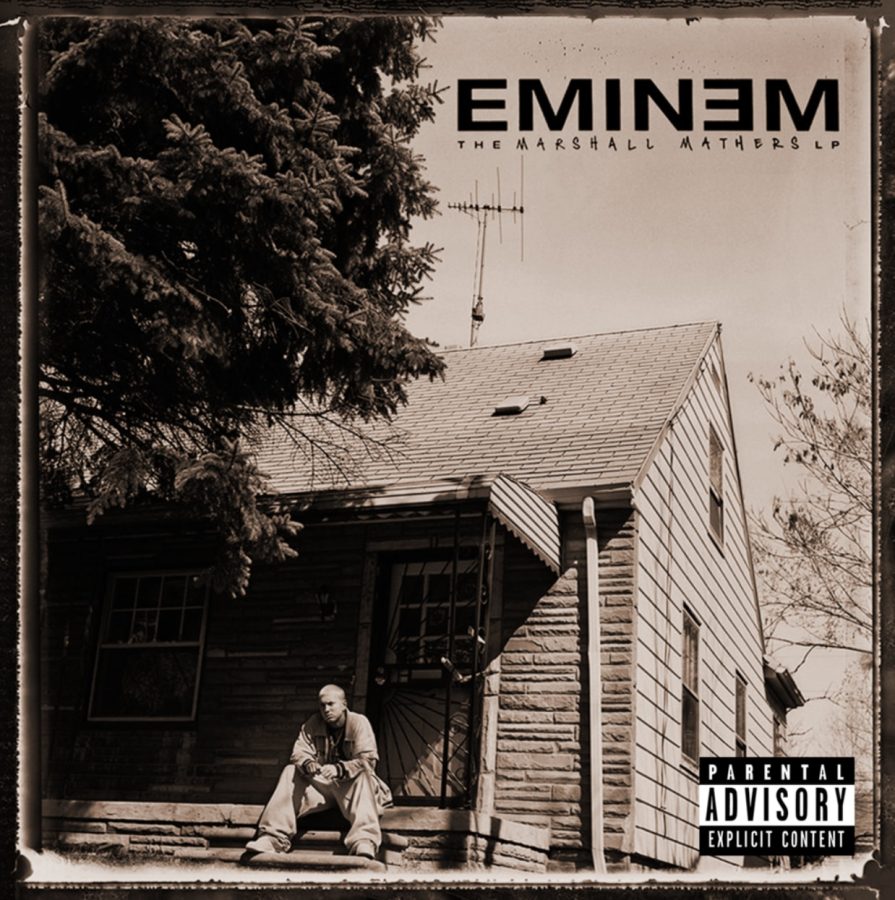The Marshall Mathers LP 20th Anniversary
May 12, 2020
How did a rap album filled with blatant misogyny, homophobia, and sick satire go 10x multi-platinum diamond? By combining elements of controversy, lyrical prowess, and raw emotion, Marshall Mathers, better known as Eminem, accomplished just that with his sophomore album The Marshall Mathers LP, which came out twenty years ago.
Eminem exploited the controversy generated from his previous album, The Slim Shady LP, which sparked accusations that it glorified violence, drugs, and bigotry. Rather than air an apology or publicly denounce the criticism, the Detroit native did the exact opposite: he wore the accusations like a badge of honor. On The Marshall Mathers LP, Eminem increased the levels of violence, drug use, homophobia, and misogyny as a caustic retort. In the song “Kill You” he raps about abusing his mother; in “Kim” he raps about murdering his wife; and in the final track, “Criminal” he blatantly says that he hates gay people. Following the album’s release, the series “Ultimate Albums” aired a documentary about it where Eminem told an interviewer “My whole attitude was like ‘alright if this is what you think I am then this is what I’m going to be.'”
As expected, the album received significant backlash from the LGBTQ community and feminist groups. Social activist groups held multiple protests in an attempt to ban the album. On the night of the 2001 Grammys, where Eminem was set to perform his single “Stan,” members of the Gay and Lesbian Alliance Against Defamation and other organizations marched outside of the venue. They held anti-hate signs and chanted “2, 4, 6, 8, Eminem is full of hate;” but demonstrations like these only drew more attention to the album and helped its legacy.
The performance, however, proved iconic in spite of the picketing. The song itself garners praise for its narrative and message. The story is about a fan who takes Eminem’s music literally and ultimately commits a murder-suicide out of frustration that Eminem ignores him. The song sent a warning to fans to not take his music too seriously and disproved critics’ claims that the artist needed shock-value to stay relevant. The performance boosted the legacy of the album as well. The album version of “Stan” samples English singer Dido’s song “Thank You” in the chorus, but during Eminem’s performance, Elton John sang it instead. With Elton John being a top-tier artist and openly-gay, the fact that he publically supported the alleged homophobe and agreed to perform with him showed that people were heavily misinterpreting Eminem’s music. The duo showed that listeners should not take all of the songs seriously and that all of the songs did not represent Marshall Mathers’ stance. His songs are oftentimes just satire or humorous entertainment. Elton John understood the perspective with which listeners were to approach his music, and that Eminem was not homophobic.
Even outside of the controversy, The Marshall Mathers LP gained the respect of the hip-hop community as one of the greatest albums ever. The complex rhyme schemes, wordplay, and creativity that Eminem exhibits go nearly unmatched. For example, in the self-titled eleventh track “Marshall Mathers,” he raps, “Double barrel 12-gauge bigger than Chris Wallace/(I’m) Pissed off ’cause Biggie and Pac just missed all this/Watching all these cheap imitations get rich off ‘em/And get dollars that shoulda been theirs like they switched wallets.” With just a couple of lines, he utilizes the poetic devices pun, anaphora, simile, and imperfect rhyme to not only praise two deceased, legendary, hip-hop artists but also condemn a wave of new-age rappers who he felt were mockeries of the two.
Perhaps the most characteristic part of the album is Eminem’s delivery. The rage he carries on songs like “Kill You,” “The Way I Am,” and “Kim” intensify the atmosphere each song creates. This bitter way of rapping would soon become Eminem’s go-to style for later albums and earn him the tag “The Angry Blonde” for quite some time. In addition, it reshaped his persona in the public eye, as it was a sharp turn from the darkly silly persona he established on The Slim Shady LP.
The Marshall Mathers LP not only changed the world’s perception of him however; it also changed the perception of white rappers. Prior to Eminem, the only mainstream white rapper to gain that much attention was Robert Winkle, better known by his stage name, Vanilla Ice. Mainly known for his hit song “Ice Ice Baby,” Vanilla Ice is widely regarded as a “one-hit-wonder” and a joke. This, for a long time, made it difficult for white rappers altogether to be taken seriously in mainstream hip-hop. Eminem’s sophomore album drastically broke through this barrier, thus making it easier for the following white rappers to be respected and accepted in the hip-hop community.
Artists today such as YBN Cordae, Tyler, The Creator, Kendrick Lamar, and more still sight the voice behind The Marshall Mathers LP as inspiration in their own styles.













































